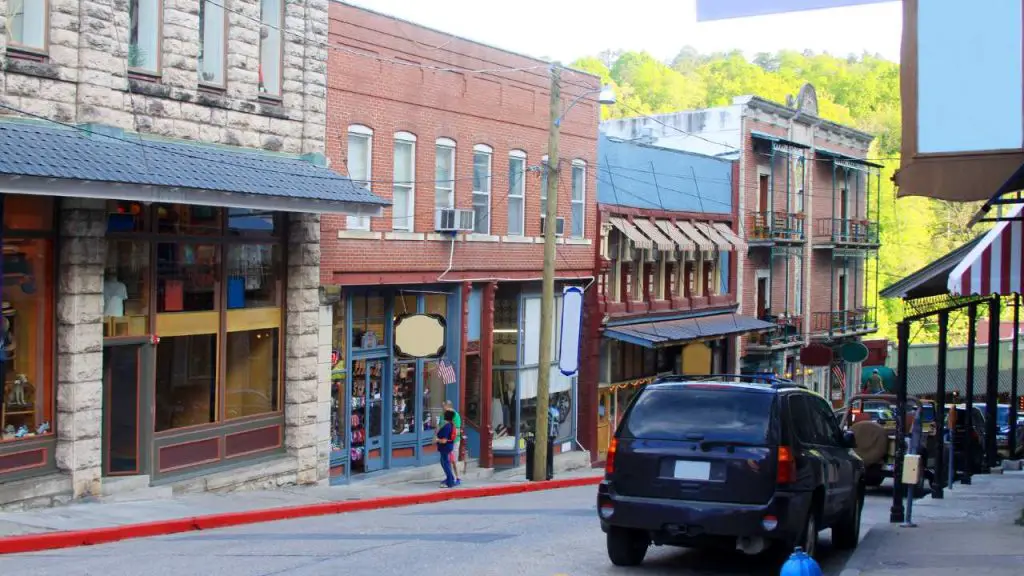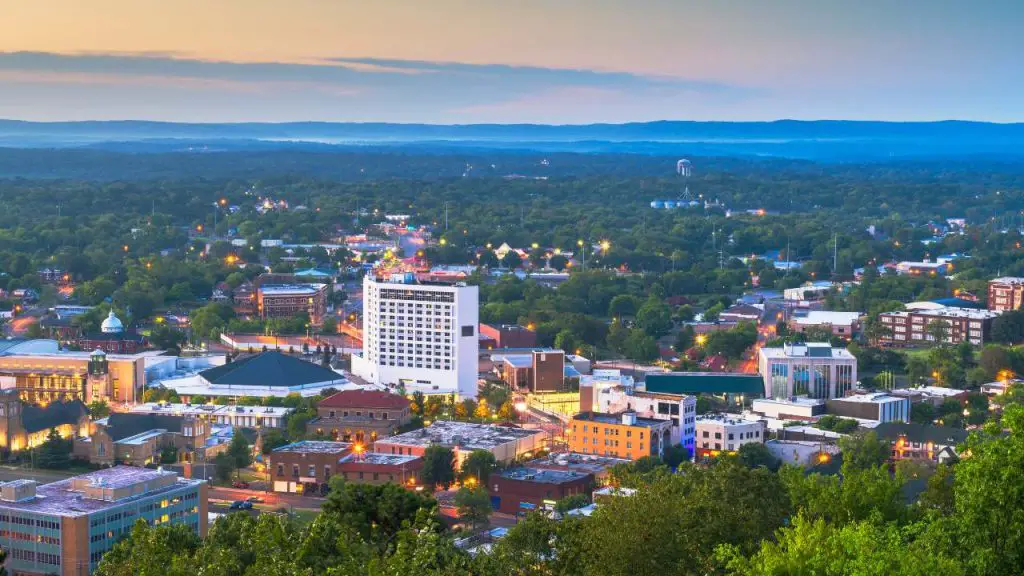Arkansas, known as the Natural State, is a place that often sparks curiosity and intrigue. Nestled in the heart of the United States, it offers a unique blend of Southern charm, diverse landscapes, and a rich cultural heritage.
But what is it really like to call Arkansas home? In this comprehensive guide, we’ll explore everything you need to know about living in Arkansas – from its climate and cost of living to its job market and quality of life.
Whether you’re considering a move or simply curious, join us as we delve into the heart of Arkansas and uncover what makes it a unique place to live.

A brief overview of what to expect when living in Arkansas.
Arkansas, also known as the “Natural State,” is a place that offers a unique blend of natural beauty, rich history, and a growing economy. With a population of over 3 million people, Arkansas is a state that’s small enough to feel like home but large enough to offer a variety of experiences.
From the bustling city life in Little Rock to the serene beauty of the Ozark Mountains, there’s something for everyone in Arkansas. The state is also known for its diverse culture, with a mix of Southern charm, Western resilience, and Midwestern friendliness.
Whether you’re a nature lover, a history buff, or someone looking for new job opportunities, Arkansas has something to offer.
Arkansas is a state that’s rich in history and natural beauty. The state’s geography is diverse, with the Ozark and Ouachita Mountains in the north and west, the Mississippi River and its fertile delta region in the east, and the pine forests and the Gulf Coastal Plain in the south.
This diverse geography offers a variety of outdoor activities, from hiking and fishing in the mountains to boating and bird-watching in the delta. The state’s history is equally diverse, with Native American heritage, Civil War sites, and historical landmarks that tell the story of America’s westward expansion.

Understanding Arkansas’s climate and weather.
Arkansas experiences a humid subtropical climate, which means the state enjoys all four seasons. Summers can be hot and humid, with temperatures often reaching the 90s, but the state’s many lakes and rivers provide plenty of opportunities for cooling off.
Winters are generally mild, with occasional snowfall in the northern and western parts of the state. Spring and fall are particularly beautiful, with wildflowers blooming in the spring and leaves changing color in the fall.
The weather in Arkansas can vary greatly depending on where you are in the state. The mountainous regions in the north and west tend to be cooler and receive more rainfall than the lowlands in the south and east.
Severe weather, including thunderstorms and tornadoes, can occur, especially in the spring. However, Arkansans are well-prepared for these events, with excellent warning systems and community preparedness programs in place.

Understanding the Cost of Living in Arkansas
One of the biggest advantages of living in Arkansas is its affordability. The cost of living in Arkansas is significantly lower than the national average. This is particularly true when it comes to housing costs.
The median value of owner-occupied housing units in Arkansas is $142,100, which is considerably lower than the national median. Whether you’re looking to buy a home in a bustling city like Little Rock or in a quiet town like Bella Vista, you’ll find that your money goes a lot further in Arkansas.
Everyday expenses in Arkansas, such as groceries and utilities, are also generally lower than the national average.
For example, the cost of groceries is about 5% lower than the national average, and utilities are about 10% lower. However, it’s important to note that costs can vary depending on where you live in the state.
For instance, living in larger cities like Little Rock or Fayetteville may be slightly more expensive than living in smaller towns or rural areas.

An analysis of housing costs – real estate, property plus sales tax in Arkansas.
When considering a move to Arkansas, it’s essential to understand the housing costs and home prices, which include real estate prices, property taxes, and sales tax.
According to data from Zillow, as of June 2023, the median home value in Arkansas is approximately $150,000. This figure is significantly lower than the national average, making Arkansas an attractive option for homebuyers seeking affordability.
Property taxes in Arkansas are also relatively low compared to other states. The average property tax rate in Arkansas is about 0.63% of the property’s assessed fair market value.
This rate can vary depending on the county and the value of the property. Additionally, the state sales tax rate in Arkansas is 6.5%, but localities can add as much as 5.125%, making the maximum sales tax rate 11.625%. This tax applies to all retail sales, leases, and rentals of most goods, as well as taxable services.

Everyday expenses in Arkansas: groceries, utilities and more.
The cost of everyday expenses in Arkansas, such as groceries and utilities, is also lower than the national average. According to data from Numbeo, as of June 2023, the cost of groceries in Little Rock, Arkansas, for example, is quite reasonable.
A gallon of milk costs around $4.02, a loaf of fresh white bread is about $3.36, and a dozen eggs are approximately $3.71. These prices are generally lower than what you would find in many other states.
When it comes to utilities, the average cost for basic utilities (including electricity, heating, cooling, water, and garbage) for a 915 sq ft apartment in Little Rock is around $239.13 per month.
This figure can vary depending on the size of the home and the specific location within the state. Overall, the cost of living in Arkansas is quite affordable, making it an attractive option for individuals and families alike.

Comparing the cost of living in Arkansas with national averages.
When compared to the national average, the cost of living in Arkansas is significantly lower. According to data from Numbeo, the cost of living in Little Rock, Arkansas, is 33.9% less expensive than in New York City. Rent in Little Rock is, on average, 73.5% lower than in New York City.
The lower cost of living in Arkansas extends beyond housing to everyday expenses like groceries, utilities, and transportation.
For example, a meal at an inexpensive restaurant in Little Rock costs around $17.50, and a monthly pass for local transport is about $36.00. These prices are significantly lower than what you would find in many other major cities across the United States.
In conclusion, Arkansas offers a lower cost of living compared to the national average, making it an attractive place to live for those seeking affordability without sacrificing quality of life.
Whether you’re considering purchasing a home, budgeting for daily expenses, or planning for taxes, Arkansas’s lower cost of living could make your dollar stretch further.

Evaluating the Quality of Life in Arkansas
When it comes to quality of life, Arkansas has a lot to offer. The state’s low cost of living, combined with its natural beauty and recreational opportunities, make it a great place to live. However, like any state, Arkansas also has its challenges.
The crime rate in Arkansas is slightly higher than the national average, with property crimes being more common than violent crimes.
However, crime rates can vary greatly from one city or town to another, and many communities in Arkansas are very safe.
Healthcare in Arkansas is a mix of strengths and challenges. The state has a number of high-quality medical facilities, including the University of Arkansas for Medical Sciences in Little Rock. However, like many rural states, access to healthcare can be a challenge in some parts of Arkansas, particularly in the more remote areas.
The state has been working to address this issue, with initiatives to expand telemedicine and attract more healthcare providers to rural areas.

Crime rates in Arkansas: A closer look.
When considering any location as a potential place to live, it’s important to understand the crime rates and how they may impact your quality of life. In Arkansas, the crime rate is slightly higher than the national average, with property crimes being more common than violent crimes.
According to NeighborhoodScout, the violent crime rate in Arkansas is 7.09 per 1,000 residents, compared to the national median of 4. However, it’s important to note that crime rates can vary greatly from one city or town to another, and many communities in Arkansas are very safe.
Arkansas law enforcement agencies are proactive in their efforts to reduce crime and ensure the safety of residents. Community policing initiatives, crime prevention programs, and public safety campaigns are common across the state.
Additionally, the state has implemented advanced crime tracking systems and data-driven approaches to crime prevention. While the crime rate is a factor to consider, it’s also important to remember that Arkansas is home to many safe, welcoming communities.

Healthcare in Arkansas: Facilities and quality.
Healthcare is a critical factor when considering a place to live. In Arkansas, the healthcare landscape is a mix of strengths and challenges.
The state is home to a number of high-quality medical facilities, including the University of Arkansas for Medical Sciences in Little Rock, which is known for its advanced medical treatments and research programs. These facilities offer a wide range of services, from routine check-ups and emergency care to specialized treatments and surgeries.
However, like many rural states, access to healthcare can be a challenge in some parts of Arkansas, particularly in the more remote areas. The state has been working to address this issue, with initiatives to expand telemedicine and attract more healthcare providers to rural areas.
Despite these challenges, Arkansas is committed to improving healthcare access and quality for all residents. It’s also worth noting that the state has a lower cost of living, which can make healthcare more affordable compared to other states.

Recreational opportunities and attractions in Arkansas.
Arkansas is often referred to as the “Natural State,” and for good reason. The state is home to a diverse range of landscapes, from the mountainous regions of the Ozarks and the Ouachitas to the fertile plains of the Arkansas Delta.
This natural beauty provides a wealth of recreational opportunities. Whether you’re an avid hiker, a dedicated bird watcher, or just someone who enjoys spending time outdoors, you’ll find plenty to do in Arkansas.
The state’s park system is particularly impressive. Arkansas State Parks manage more than 50 parks throughout the state, each offering unique attractions and activities. For example, you can dig for diamonds at Crater of Diamonds State Park, explore the rugged beauty of Devil’s Den State Park, or take a relaxing dip in the thermal waters of Hot Springs National Park. In addition to natural attractions, Arkansas also offers a wealth of cultural and historical sites, including museums, art galleries, and music festivals. Whether you’re a nature lover, a history buff, or a culture enthusiast, Arkansas has something to offer.

The Job Market in Arkansas
Arkansas has a diverse economy with several key industries. The state is a major producer of poultry, soybeans, and rice, making agriculture a significant part of the economy. Arkansas is also home to several Fortune 500 companies, including Walmart, Tyson Foods, and J.B. Hunt, which provide a wide range of job opportunities.
The state’s unemployment rate is in line with the national average, and job growth has been steady in recent years.
Average salaries in Arkansas are lower than the national average, reflecting the state’s lower cost of living. However, wages can vary greatly depending on the industry and the specific job.
For example, jobs in healthcare and technology tend to pay well, while jobs in agriculture and retail tend to pay less. Despite the lower average salary, many people find that their income goes further in Arkansas due to the state’s low cost of living.

Key industries contributing to Arkansas’s economy.
Arkansas’s economy is diverse and robust, with several key industries contributing significantly to the state’s economic health. Agriculture has always been a cornerstone of the Arkansas economy, with the state being a major producer of rice, soybeans, cotton, poultry, and cattle. However, Arkansas’s economy has evolved over the years to include a variety of other industries.
Manufacturing, for instance, plays a crucial role, with companies producing everything from food products to aerospace and defense equipment. The state is also home to several Fortune 500 companies, including Walmart, which is based in Bentonville, and Tyson Foods.
Healthcare is another significant sector in Arkansas, providing a wide range of job opportunities and contributing to the state’s median household income. The state’s healthcare industry is not only a major employer but also a key player in providing essential services to the residents of Arkansas.
In addition, the tech industry is growing in the state, particularly in the northwest region, which is becoming a hub for tech startups and established companies alike. If you’re considering moving to Arkansas, these thriving industries could offer excellent job opportunities.

Job growth rate in Arkansas: A detailed analysis.
Arkansas has seen steady job growth over the past few years, with several industries showing significant increases in employment. The healthcare sector, for instance, has seen consistent growth, fueled by the state’s aging population and increased demand for health services.
The tech industry, particularly in northwest Arkansas, has also seen impressive job growth, with tech companies both large and small contributing to the state’s economy.
However, it’s important to note that job growth can vary by region. While some areas of the state, such as northwest Arkansas, are experiencing rapid job growth, other areas may not be growing as quickly.
This is something to consider if you’re thinking about moving to Arkansas and are looking for job opportunities. Overall, though, the state’s job growth rate is positive, which bodes well for the future of Arkansas’s economy.

Average salaries in Arkansas and how they compare with national averages.
When it comes to average salaries, Arkansas offers competitive wages in several industries. According to the latest figures, the median household income for Arkansas was $52,528 in 2021.
While this is lower than the national average, it’s important to consider the cost of living in Arkansas, which is also lower than the national average. This means that your salary might go further in Arkansas than it would in more expensive states.
In terms of specific industries, healthcare professionals in Arkansas can expect to earn competitive salaries, with wages often above the state average. The tech industry also offers attractive salaries, particularly for those with a bachelor’s degree or higher. If you’re considering retiring in Arkansas, you’ll be pleased to know that the state’s lower cost of living can make your retirement income stretch further.
Overall, while salaries in Arkansas may be lower on average than in some other states, they are generally in line with the cost of living, making Arkansas a good state to live in from a financial perspective.

Education Opportunities in Arkansas
Arkansas places a strong emphasis on education, with a variety of options for students of all ages.
The state’s public school system serves over 470,000 students, with a high school graduation rate that’s on par with the national average. Arkansas also has a number of highly rated private schools, offering parents plenty of choices for their children’s education.
Higher education in Arkansas is equally diverse, with more than 40 colleges and universities across the state. These include the University of Arkansas, a major research university with campuses in Fayetteville and Little Rock, as well as a number of smaller colleges and community colleges.
Whether you’re seeking a bachelor’s degree, a master’s degree, or a professional certification, you’ll find a wide range of programs and opportunities in Arkansas.

Overview of Arkansas’s public and private school systems.
Arkansas’s public and private school systems offer a diverse range of educational opportunities for students of all ages. The state’s public schools are part of the Arkansas Department of Education, which oversees the education of more than 490,000 students across the state.
These students attend one of the state’s 1,106 public district schools, 101 public charter schools, or 2,493 private schools. The state’s public schools are known for their commitment to academic excellence, with several schools receiving high ratings for their academic performance and equity.
In addition to traditional public schools, Arkansas also has a robust system of private schools. These schools offer an alternative to public education, with smaller class sizes, specialized programs, and a focus on individualized learning.
Some of the top-rated private schools in the state include Harding University, Hendrix College, and the University of the Ozarks. Whether you’re looking for a large public school or a small private school, Arkansas’s education system has something to offer every student.

Higher education in Arkansas: What to expect.
When it comes to higher education (getting a bachelor’s degree), Arkansas offers a wealth of opportunities. The state is home to a variety of colleges and universities, both public and private, that offer a wide range of degree programs.
The University of Arkansas, located in Fayetteville, is the state’s largest university and offers over 200 undergraduate, graduate, and professional degree programs. Other notable public universities include Arkansas State University and the University of Arkansas at Pine Bluff.
In addition to public universities, Arkansas also boasts a number of highly-rated private colleges. Harding University, located in Searcy, is known for its small class sizes and student-focused approach to learning. Hendrix College, a liberal arts college in Conway, is renowned for its innovative curriculum and commitment to experiential learning.
Whether you’re interested in studying the sciences, humanities, business, or arts, Arkansas’s higher education institutions offer a diverse range of programs to suit every interest.
With a strong commitment to academic excellence, affordable tuition rates, and a supportive community, Arkansas’s colleges and universities provide students with the tools they need to succeed in their chosen field.

Transportation in Arkansas: A Comprehensive Guide
Getting around in Arkansas is generally easy, thanks to the state’s well-maintained road network and public transportation options. The state has more than 16,000 miles of highways, including several major interstates, making it easy to travel by car.
For those who prefer not to drive, Arkansas has a number of public transportation options, including bus services in the larger cities and a statewide intercity bus network.
Traffic conditions in Arkansas are generally good, with less congestion than many other states. The average commute time in Arkansas is 22 minutes, which is shorter than the national average.
However, commute times can vary depending on where you live and work. For example, commute times in larger cities like Little Rock may be longer, especially during peak hours.

Culture and Diversity: The Arkansas Experience
Arkansas has a rich cultural heritage, with a variety of events and festivals that celebrate the state’s history and diversity. From the annual King Biscuit Blues Festival in Helena to the International Greek Food Festival in Little Rock, there’s always something happening in Arkansas.
The state is also home to a number of cultural institutions, including the Crystal Bridges Museum of American Art in Bentonville and the Arkansas Repertory Theatre in Little Rock.
Diversity is a key part of the Arkansas experience. The state’s population is a mix of different races and ethnicities, with a growing Hispanic and Latino population. Arkansas is also home to a number of Native American communities, particularly in the northwest part of the state.
This diversity is reflected in the state’s culture, with a variety of foods,music, and traditions from different cultures.

Cultural events and festivals in Arkansas.
Arkansas is a state that is rich in culture and tradition, and this is reflected in the numerous events and festivals that take place throughout the year. From music and food to arts and crafts, there’s always something happening in the Natural State.
For instance, the Sunken Lands Songwriting Circle in Jonesboro is a testament to the state’s deep-rooted music culture. The 76th Annual Mt. Nebo Chicken Fry in Dardanelle is a culinary delight that showcases the state’s love for food and community gatherings.
The Bikes, Blues, & BBQ event in Rogers is a unique blend of motorbike culture, music, and food. These events not only provide entertainment but also offer a glimpse into the state’s diverse cultural fabric.
Arkansas is also home to a variety of historical and educational events. The “Generations of Memories: A Walk Through the History of Logoly State Park” in Magnolia and the “In Their Wallet: Money in 19th Century Washington” Exhibit in Washington State Park are examples of events that offer a deep dive into the state’s rich history.
The state also hosts numerous outdoor activities like the Northwoods Dawg Daze of Summer Challenge in Hot Springs, which showcases the state’s natural beauty and love for outdoor adventures. These events and festivals are a testament to the vibrant and diverse cultural scene in Arkansas.

Diversity and inclusivity in Arkansas: A deep dive.
Arkansas is a state that values diversity and inclusivity. According to the U.S. Census Bureau, the state is home to a diverse population with a variety of racial and ethnic backgrounds.
The state’s population is predominantly White (78.5%), but it also has significant Black or African American (15.6%), Hispanic or Latino (8.6%), and Asian (1.8%) communities. This diversity is reflected in the state’s culture, food, music, and festivals.
Inclusivity is also a key aspect of life in Arkansas. The state is home to people of all ages, with 22.9% of the population under 18 years, and 17.8% over 65 years. The gender distribution is almost equal, with female persons making up 50.6% of the population.
The state also values education, with 87.7% of persons aged 25 years and above being high school graduates, and 24.3% holding a bachelor’s degree or higher. Arkansas also has a significant number of foreign-born persons (4.9%), indicating its openness to immigrants.
In terms of economic diversity, Arkansas has a mixed economy with key industries in agriculture, manufacturing, and services. The state has a civilian labor force participation rate of 58.1%, with women making up 54.2% of the labor force.
The state’s commitment to diversity and inclusivity is evident in its demographic composition, cultural events, and economic opportunities.

Pros and Cons of Living in Arkansas
Like any state, living in Arkansas comes with its own set of pros and cons. On the positive side, Arkansas offers a low cost of living, beautiful natural scenery, and a friendly, community-oriented culture.
The state’s economy is diverse and growing, with job opportunities in a variety of industries. Arkansas also offers a good quality of life, with plenty of recreational opportunities, cultural events, and educational options.
On the downside, Arkansas faces challenges in areas such as healthcare access and crime rates. While the state has many high-quality medical facilities, access to healthcare can be a challenge in some rural areas.
Crime rates in Arkansas are slightly higher than the national average, although many communities in the state are very safe. Despite these challenges, many people who live in Arkansas love the state for its natural beauty, friendly people, and affordable cost of living.

The benefits of living in Arkansas.
Arkansas, known as the “Natural State,” offers a multitude of benefits for those who call it home. One of the most significant advantages is the cost of living. Arkansas consistently ranks as one of the most affordable states in the U.S., with housing costs significantly below the national average.
This affordability extends to other areas as well, such as groceries and utilities, making it easier for residents to stretch their dollars further.
In addition to its affordability, Arkansas is renowned for its natural beauty. The state boasts 52 state parks, three national forests, and countless lakes and rivers. Outdoor enthusiasts will find no shortage of activities to enjoy, from hiking and fishing in the Ozark Mountains to boating on the Arkansas River.
The state’s mild climate allows for outdoor activities year-round, and the changing seasons offer stunning displays of natural beauty.

The challenges of living in Arkansas.
While Arkansas offers many benefits, it also has its share of challenges. One of the most significant is the state’s healthcare system. While there are high-quality medical facilities available, particularly in urban areas, access to healthcare can be a challenge in more rural parts of the state.
This is a common issue in many rural states, and Arkansas has been taking steps to address it, such as expanding telemedicine services.
Another challenge in Arkansas is the crime rate, which is higher than the national average. However, it’s important to note that crime rates can vary significantly from one area to another. Many communities in Arkansas have low crime rates and are safe places to live.
Additionally, the state has been working to address this issue, with initiatives aimed at reducing crime and improving safety. Despite these challenges, many residents find that the benefits of living in Arkansas—such as the low cost of living and the natural beauty—outweigh the negatives.

Best places to live in Arkansas.
Arkansas, with its diverse landscapes and communities, offers a plethora of residential options beyond the well-known cities of Little Rock, Fayetteville, and Bentonville.
For instance, Hot Springs is a city that captivates with its historic bathhouses and the stunning Hot Springs National Park. Eureka Springs, on the other hand, enchants with its Victorian architecture and natural splendor.
If you’re seeking a more laid-back lifestyle, smaller towns like Harrison and Mountain Home could be your ideal destinations. These towns offer a tranquil pace of life, abundant outdoor activities, and tight-knit communities.
But the list doesn’t end there. Fort Smith, Pine Bluff, and Rogers each have their unique charm and advantages, from diverse job opportunities to recreational activities and educational facilities. Benton, Conway, and Bella Vista are other noteworthy places that offer a balanced lifestyle with their own unique attractions.
Cities like Jacksonville, Jonesboro, and Springdale offer a vibrant community life, while places like Cherokee Village, Texarkana, and Searcy offer a blend of small-town charm and modern amenities. Melbourne, El Dorado, and Russellville also present their own unique lifestyle options, making the choice even more diverse.
So, whether you’re in search of the hustle and bustle of a city, the tranquility of a small town, or something in between, rest assured that Arkansas has a place that will fit your lifestyle perfectly.

Is Arkansas a Good Place to Live?
So, is Arkansas a good place to live? The answer to that question will depend on your personal preferences and circumstances. If you value a low cost of living, natural beauty, and a friendly, community-oriented culture, then Arkansas could be a great fit for you.
The state offers a good quality of life, with plenty of recreational opportunities, cultural events, and educational options.
However, like any state, Arkansas also has its challenges. Access to healthcare can be a challenge in some rural areas, and crime rates are slightly higher than the national average. But for many people, the benefits of living in Arkansas outweigh the challenges.
If you’re considering a move to the Natural State, it’s worth taking the time to explore all that Arkansas has to offer. From the bustling city life in Little Rock to the serene beauty of the Ozark Mountains, there’s something for everyone in Arkansas.

Should you move to Arkansas? Is it a good state?
Relocating to a new state is a significant life decision, encompassing a multitude of factors. If Arkansas is on your radar, there are numerous compelling reasons why this could be an excellent choice. First and foremost, Arkansas is a state where affordability is a key advantage.
Your hard-earned money can stretch further here compared to many other states. Housing prices, for instance, are notably affordable, with the median home value considerably lower than the national average.
This cost-effectiveness extends to other aspects of life too, such as groceries and utilities, making Arkansas an appealing option for those aiming to maximize their budget.
Beyond its cost-effectiveness, Arkansas is renowned for its stunning natural beauty. The state boasts a diverse array of landscapes, from the majestic Ozarks and Ouachitas mountains to the fertile plains of the Arkansas Delta.

This isn’t just scenic eye candy – it opens up a world of outdoor activities like hiking, fishing, and camping. If you’re an outdoor enthusiast, Arkansas has something for everyone, including the thrill of spotting black bears in the northern Arkansas wilderness.
However, like any place, Arkansas has its challenges. While the cost of living is low, average salaries follow suit, although this is somewhat balanced by the lower living costs.
Additionally, while strides have been made in healthcare and education (including opportunities for obtaining a bachelor’s degree), there are areas where it trails behind other states. For example, access to health care can be a struggle in some rural areas, and while there are many best schools in the state, the education system also faces challenges.
Despite these considerations, many people moving to Arkansas find that the pros significantly outweigh the cons. The state’s friendly, community-oriented culture, its diverse and growing economy, and the high quality of life it offers make it a place many are proud to call home.

So, is Arkansas a good place to live? Is it a great state? The answer will depend on your personal circumstances and priorities, but for many, the answer is a resounding yes. If you’re looking for a state that offers a blend of affordability, natural beauty, and a welcoming community, Arkansas could be just the place you’re looking for.
It’s one of the best places to retire, and unless you live right in the heart of a bustling city, you’ll find a slower pace of life that many people find appealing.
Before making your decision about moving to Arkansas, it’s important to consider all the pros and cons, but many find that the state’s offerings make it a compelling choice.
Resources and Links
- U.S. Census Bureau: Provides up-to-date demographic, economic, and geographic data about Arkansas. Link
- U.S. News & World Report – Best States: Offers rankings and information about various aspects of life in Arkansas, including education, economy, and healthcare. Link
- Bureau of Labor Statistics – Arkansas: Provides detailed information about the job market, employment, and wages in Arkansas. Link
- Arkansas Department of Education: Offers data and information about the state’s public and private school systems. Link
- Arkansas Economic Development Commission: Provides information about key industries and economic growth in Arkansas. Link
- Arkansas Department of Parks, Heritage, and Tourism: Offers information about recreational opportunities, cultural events, and attractions in Arkansas. Link
- Arkansas Department of Transportation: Provides information about the state’s road infrastructure and public transportation options. Link
- Arkansas Department of Health: Offers information about healthcare facilities and services in Arkansas. Link
- Arkansas Crime Information Center: Provides data and information about crime rates in Arkansas. Link
- NerdWallet’s Cost of Living Calculator: Offers a detailed breakdown of the cost of living in Arkansas, including housing, groceries, and utilities. Link